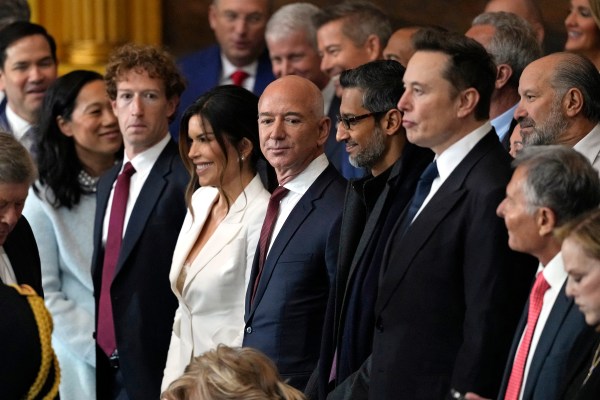If you want to know how loyal someone is to the modern GOP, don’t ask them which party they belong to. Ask them how they feel about Liz Cheney.
It’s a near-perfect gauge of tribal affiliation. If they accuse her of being only out for herself after she sacrificed her career in politics to oppose Donald Trump, they’re loathsome Republican hacks. If they concede grudgingly that she has a point about Trump yet unfailingly find some reason to criticize her, they’re anti-anti-Trump conservatives. And if they coo about her courage, selflessness, and patriotism, they’re over here with me in Never Trump la-la-land.
“The Cheney test” is a reliable metric in my experience but it’s not foolproof. We’re kidding ourselves if we believe every objection to her reincarnation as a Kamala Harris surrogate is made in bad faith or sour grapes.
It’s fair to ask her to reconcile her praise for Harris as the candidate of “norms” with Harris’ norm-busting on court-packing and filibuster exceptions. If Cheney’s answer is that Trump would subvert the legal order instead of working within it, okay, but civic objections to the Democrat’s plans demand a response when voters are being asked to prioritize civics.
It’s also fair to ask Cheney how a supposedly staunch pro-lifer like herself justifies supporting a Democrat who wants to codify abortion rights at the federal level and to smash the Senate filibuster to do it. She could answer by pointing once again to civic norms—“all policy disagreements are on hold until after we save the Constitution from Donald Trump”—but that’s not what she said when the subject came up at her joint town hall with Harris in Pennsylvania on Monday.
MS. CHENEY: Can I add to this just to—because I—I think it’s such an important point. And I think there are many of us around the country who have been pro-life but who have watched what’s going on in our states since the Dobbs decision and have watched state legislatures put in place laws that are resulting in women not getting the care they need.
And so, I think this—this is not an issue that we’re seeing break down across party lines—
THE VICE PRESIDENT: Right.
MS. CHENEY: —but I think we’re seeing people come together to say what has happened to women, when women are facing situations where they can’t get the care they need—where in places like Texas, for example, the attorney general is talking about suing—is suing to get access to women’s medical records—that’s not sustainable for us as—as a country, and—and it has to change.
Well.
Liz Cheney hasn’t just opposed abortion in the past. As Charles Cooke reminded readers at National Review today, she’s been so militantly anti-abortion that she co-sponsored a bill in 2021 that would have redefined “life” for purposes of the 14th Amendment to begin at conception. Had that bill been enacted, every fertilized egg in the United States theoretically would have been entitled to due process before termination. If Cheney is worried that women are having trouble getting “the care they need” in red states post-Dobbs, why didn’t she worry about the trouble they’d have had getting care under the legislation she endorsed?
She’s now stumping for a liberal who wants to override state bans by granting abortion rights to women as a matter of federal law, the bizarro-world opposite of the 2021 bill. It’s true, as Jonah Goldberg says, that the Republican hacks hooting at Cheney today for being “pro-choice” are conveniently ignoring Trump’s own moderation on the issue but a reversal this astonishing deserves an explanation. Has Cheney changed her mind on the issue or is she biting her tongue about Harris’ plans for electoral reasons?
Only she knows. But it’s a little of both, I’d guess.
Stumping and salesmanship.
What should Cheney have said when the topic of abortion came up at her event with Harris?
I can think of a number of truthful answers. But each would have been problematic under the circumstances, if not mortifying.
Answer one: “Don’t worry about Kamala on abortion, fellow conservatives. Republicans are a lock to control the Senate next year so she won’t be getting anything done on that issue. Or on any issue, really.”
Answer two: “Yeah, about that 2021 bill I co-sponsored. We introduced it a month after January 6 and I needed some red meat to toss at conservatives who were mad at me for voting to impeach Trump. It was a ‘messaging bill’ designed to broadly signal commitment to the pro-life cause, not unlike the wacky Green New Deal stuff that Democrats sometimes push to impress environmentalists. We knew it wouldn’t pass.”
Answer three: “All policy disagreements are on hold until after we save the Constitution from Donald Trump.”
That third answer is the correct one. I was convinced by it long before Harris became her party’s nominee. But it too would have been received awkwardly by the audience Liz Cheney is hoping to persuade.
Cheney is on the trail with Harris because the campaign believes she can bring some traditional conservatives around to voting Democratic. But any Reaganite voter who still needs persuading at this late hour has heard that third answer given hundreds of times before by dozens of politicians, Harris and Cheney among them, and hasn’t been moved by it yet. Something is keeping them from crossing the aisle. That something is probably policy.
They might be willing to “betray” the Republican Party by casting their ballot for Harris but they don’t want to betray conservatism. Cheney’s abortion answer is designed to reassure them that they aren’t doing so if they back the pro-choicer this time: She’s painting a picture for them of a pro-life legal regime that isn’t wrong per se but has produced too many unintended consequences in its post-Dobbs zeal and now requires a “correction.” Don’t think of yourself as voting for abortion on demand when you vote for Harris, she’s telling them, think of yourself as voting for … moderation.
Will that work? Beats me. But by definition, I suspect, right-wingers who are uncomfortable with another Trump presidency regard themselves as “moderate” even if they’re dogmatic Reaganites. The Cheney pitch to the persuadable right at its most basic level is: Be reasonable. That’s essentially her pitch on abortion too.
All of which is ironic. The reason Never Trump conservatives haven’t pressured Harris or Joe Biden to make concessions to them on policy in return for their support is because they don’t want to undermine their civic case against Trump. If Trump is a threat to the constitutional order then one’s opposition to him shouldn’t hinge on whether Democrats are willing to cut the top marginal income tax rate by 5 points or whatever. The alliance with liberals against Trump is a moral one; the more it’s watered down with policy demands, the more the moral case will appear to have an ulterior motive.
Yet here’s Liz Cheney, the supreme example of a conservative who prioritized civics over policy, trying in the home stretch of the campaign to reassure conservatives on policy, not civics. The permission structure she’s creating for crossing the aisle now includes a plank on abortion in which the right—including and especially right-leaning suburban women who might not be hardline on abortion to begin with—can vote for a pro-choice Democrat with a clear conscience in the belief that they’ll be making abortion law better somehow by doing so.
Cheney’s become a salesman. She’s trying to sell a particular audience on a particular product. This is her sales pitch.
That’s the problem, you might say, echoing Charles Cooke. Why has she chosen to become a salesman? “For a couple of weeks now, I have been publicly critical of Liz Cheney’s decision to stump for Kamala Harris,” he writes. “My argument has been that endorsing a candidate and stumping for a candidate are different things, and that, once one starts campaigning as part of a team, the temptation to shed or attenuate one’s true convictions becomes acute.” When Cheney agreed to hit the trail, she committed to tying herself in knots whenever she was confronted with points of obvious disagreement between herself and her candidate. She could have endorsed Harris in a statement, the argument goes, and left it at that.
But … why would she do that? Why go to the trouble of endorsing a candidate and then forgo the opportunity to maximize the impact of her endorsement? Especially her and especially now.
Imagine believing, as Liz Cheney does, that a second Trump presidency will put the American experiment itself at risk. Imagine then being invited to campaign for Trump’s opponent because you might be able to convince a decisive number of Republicans to switch sides and help save the country.
And now imagine rejecting that invitation: “No, sorry. No thanks. I’m afraid I might come off as a hypocrite if someone asks me a question about abortion.”
On a policy matter as grave as this one, it’s fair to ask Cheney to explain her evolution. But since the moment the riot began on January 6, her view of American politics has been that we’re in a dire civic crisis and liberals of every stripe are duty-bound to join together and overcome it. It would have been ridiculous for her to create an exception for herself from that duty with less than a month to go and the race deadlocked.
“All policy disagreements are on hold until after we save the Constitution from Donald Trump.” If Cheney needs to downplay the extent of her disagreement with the left on abortion to help make the sale on that point, that’s what she’s going to do, it seems.
Having said all that, I wonder if there’s more of an earnest conversion to her new stance on abortion than we might assume.
Bad intentions.
Liz Cheney has always been more willing than most modern Republicans to rethink her positions.
She has acknowledged that she shouldn’t have supported Trump before January 6. And she reversed herself on same-sex marriage in 2021 after years of opposing it. Even before her alliance with Democrats, she was more likely than the average right-winger to reexamine her convictions.
Now that the alliance has been forged, it’d be surprising if she hasn’t already begun to reexamine them.
Yuval Levin has made the point that, although politicians have a high capacity for cynicism, in most cases it’s not limitless. Apart from truly abnormal specimens like Trump, the human mind grows exhausted from having to maintain a lie. That’s why Reaganite normies like Mike Lee and Marco Rubio devolved from harsh Trump critics in 2016 to insincere Trump flatterers bent on protecting their status in the party to the repulsive Trump enthusiasts we know today. To all appearances, it became too taxing on them mentally to keep lying to themselves and others about their faith in Trump’s greatness. To sleep at night and coexist comfortably with those around them, they had to start believing it.
Perhaps the same thing happened to Liz Cheney as she spent less time with Republicans and more with Democrats. Her old party despises her as a traitor to the postliberal cause while her new friends on the left celebrate her as an American hero. It must be stressful for her on some level to be around so many admirers whose views on abortion she should logically find repugnant; to reduce that stress, maybe her own convictions began to slide, like Rubio’s and Lee’s, away from repugnance and toward conciliation.
She’s found some common ground with the other party. How could it not affect her estimations of their fitness to govern?
One day she wakes up and finds herself complaining about women not getting “the care they need” in red states. And she believes it. It’s not a contrived sales pitch. Psychologically, she’s set down the burden of unresolvable differences between herself and her new allies. She probably feels better than she has in years, if not quite as special as Mike Lee feels when Donald Trump smiles beatifically at him.
But if you don’t like armchair psychology of political figures, we can speculate about a Cheney abortion conversion in other terms. It’s this simple: Hasn’t every refugee from Trump’s party had cause to reexamine their convictions since 2016?
To reexamine is not to renounce. I’d bet that Liz Cheney is still broadly pro-life in her preferences. But I’d be shocked if she hasn’t looked around at what’s become of the conservative movement and wondered if the good intentions behind the right’s agenda that she spent her life taking for granted weren’t as good as she assumed.
It seems like more than a coincidence, for instance, that her change of heart about gay marriage happened shortly after she gained pariah status in the GOP for voting to impeach Trump. For years, gay activists insisted that marriage bans were motivated by prejudice; social conservatives countered that they were motivated by respect for the tradition of marriage. After the right rallied behind Trump’s coup attempt, is it any wonder that Cheney no longer gave them the same benefit of the doubt about their supposedly noble regard for tradition?
Politics is all about intentions. It shouldn’t be, you might say; if there’s any sphere of life in which only results should matter, irrespective of motive, it’s policymaking. But decent people don’t want to make common cause with those whose intentions they believe are malevolent, particularly in an era in which personal identity derives from political identity more than it used to. Having been disillusioned repeatedly by the behavior of the American right, Liz Cheney might now look at state abortion laws less as mechanisms to protect the unborn than as opportunities for ambitious Republican prosecutors to grandstand by making examples of women with troubled pregnancies.
For the same reason, it wouldn’t surprise me to learn that she’s become cooler toward gun rights than she used to be. It’s easy to be a molon labe conservative when you conceive of the right’s interest in gun ownership as a defensive measure against neighborhood crime or potential government tyranny. Now that the right has embraced a culture of intimidation and turned its own would-be tyrant into a national savior, the interest no longer seems so defensive. In 2024, if someone shows up on the sidewalk outside Liz Cheney’s home wearing a red hat with an AR-15 slung across his back, she’s not going to think, “Look at that patriot proudly exercising his right to constitutional carry.” She’s going to think, “Hit the deck.” Understandably.
Intentions matter. Cheney would be a fool to assume that all of Kamala Harris’ intentions are good—again, I refer you to court-packing—but she’d also be a fool not to recognize that Trump’s coup-crazy GOP is significantly more malevolent than Harris’ Democratic Party. That can’t help but color her judgments about their respective policy agendas.
But here’s the tragedy that awaits her: Win or lose, she’s in for rough sledding with her new liberal friends.
If Harris wins, an initial burst of gratitude toward Cheney will give way to apprehension on the left as reports swirl about her joining the Cabinet. On Monday, Jon Stewart half-jokingly asked Tim Walz if it’s really necessary to be nice to the Cheneys; don’t worry, Walz assured him, we’re not going to take their advice. Liz might get an ambassadorship somewhere, possibly even at the United Nations, but progressives will make sure she’s nowhere near having real influence.
Whereas if Harris loses, Cheney is all teed up to be a scapegoat. Why did Kamala spend so much time in the final weeks campaigning with a has-been who was never going to flip meaningful votes on the cultist right? Democrats will demand to know. Harris should have focused on turning out progressives, they’ll say, not hopeless conservatives who’ll always contrive some excuse to prefer being governed by a fascist instead of a liberal.
Even in the best-case scenario for Cheney, where Harris wins and “Cheney conservatives” prove decisive, she’ll spend the rest of her life being held responsible for Trump’s defeat by a movement of feral authoritarians. (Most of whom, strangely, will also insist that the election was rigged, rendering the ballots of Cheney conservatives irrelevant.) She’ll never have a moment’s peace. But I suspect she prefers that outcome, warts and all, to the alternative. And with Harris in office, at least she won’t need to worry about being harassed by the federal government as punishment for her “disloyalty” to the president. America will still be America! Barely.










Please note that we at The Dispatch hold ourselves, our work, and our commenters to a higher standard than other places on the internet. We welcome comments that foster genuine debate or discussion—including comments critical of us or our work—but responses that include ad hominem attacks on fellow Dispatch members or are intended to stoke fear and anger may be moderated.
With your membership, you only have the ability to comment on The Morning Dispatch articles. Consider upgrading to join the conversation everywhere.